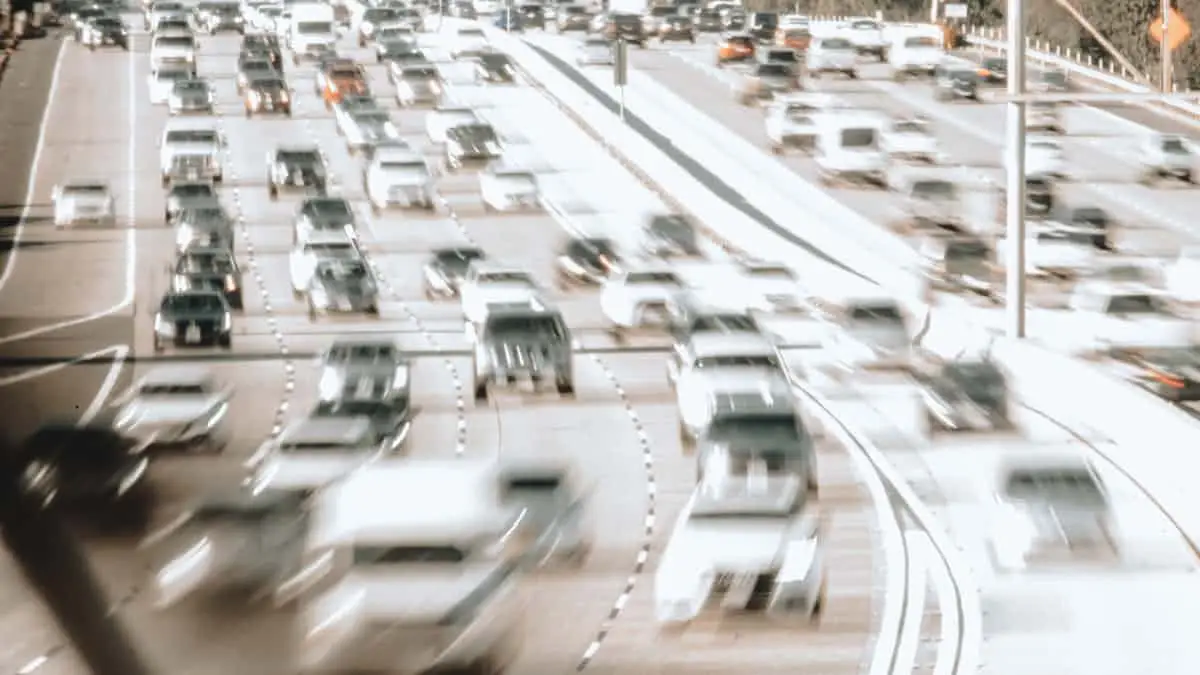I often get a bewildered response, sometimes even outright disbelief, when I express my deep-seated aversion to cars. "But … you're so libertarian!" they exclaim. Apparently, in many people's minds, cars are a cornerstone of the capitalist dream.
My disdain for our car-centric society is not a betrayal of my libertarian principles; it's a direct consequence of them. In fact, the very environment that forces us into car dependency is a testament to the failures of government intervention, not the triumphs of the free market.
Our cities and suburbs, jammed with traffic, stretched out with isolated houses miles from anywhere useful, and sliced up by these massive highways, none of this just happened naturally from people voting with their wallets. It's the direct result of government policies that have been shoving cars down our throats for decades, killing off every other way to get around.
What is the most prominent piece of infrastructure in America? It's not something built by private enterprise; it's the Interstate Highway System, a monument to government planning and spending. The Federal-Aid Highway Act of 1956 didn't bubble up from real market demand; it was a top-down power grab that remade America in the image of the automobile, driven as much by federal ambition as by the political muscle of auto, oil, and construction lobbies.
And what came with those highways?
The Government's Heavy Hand
Eminent Domain: To carve out these massive arteries, governments wielded the power of eminent domain, forcibly seizing private land, destroying vibrant communities in the process. Tell me, where in the libertarian ideal is the justification for the state to bulldoze your property for the sake of a government-favored industry?
Zoning Laws: The ubiquitous single-use zoning ordinances that corrupt our cities and suburbs are anything but a free-market phenomenon. These government mandates dictate where different types of buildings can be located, forcing residential areas to be segregated from commercial zones. This artificial separation makes walking or biking for even basic errands impractical, effectively mandating car ownership. It's a regulatory straightjacket on how we build and live.
Minimum Parking Requirements: Another seemingly innocuous regulation that has profound consequences. By forcing developers to include a certain number of parking spaces with every new building, regardless of actual demand, governments have inflated construction costs, consumed valuable land, and ensured that our urban and suburban landscapes are dominated by parking lots. This is a direct subsidy for car usage, baked into our legal code.
The Myth of Car Capitalism
The myth that cars are a purely capitalist creation, a myth championed by both self-proclaimed capitalists and socialists, ignores the massive government role in forcing this reality on us. Real capitalism thrives on choice and the efficient allocation of resources based on genuine demand and accurate pricing. Our car-centric system distorts these principles at every turn.
Consider the externalities, the costs associated with driving that aren't borne by the individual driver. Congestion, pollution, and the wear and tear on public infrastructure are all socialized costs, meaning everyone pays for them, regardless of their car usage. In a truly free market, these costs would be internalized through mechanisms like congestion pricing, making driving more expensive to those abusing it and making other options more competitive.
What a Real Free Market Could Deliver
So, what kind of transportation landscape would a truly free market produce? I suspect it would be far more diverse and human-scaled. We might see:
- Privately funded and operated public transit systems competing for riders
- A greater emphasis on walkable and bikeable neighborhoods driven by consumer preference and efficient land use
- Innovative, smaller-scale transportation solutions we haven't even fully imagined yet
- Cars as one option among many, not the default necessity they are today
My desire for walkable cities and a move away from car dependency isn't a rejection of capitalism; it's a call for it. It's me hoping for a world shaped by actual market forces and not this government-engineered nightmare that's left us stuck in traffic and unsustainable sprawl.
So when someone looks at me sideways for being a libertarian who loathes cars, I simply explain: it's not the free market that built this car-dependent world. It was government, and I'd prefer to see what a truly free market in transportation and urban development could create.

Leave a Comment
Your email address will not be published. Comments are moderated before appearing.
Supports:
**bold**,*italic*,`code`,[links](url)Comments (0)
Loading comments...